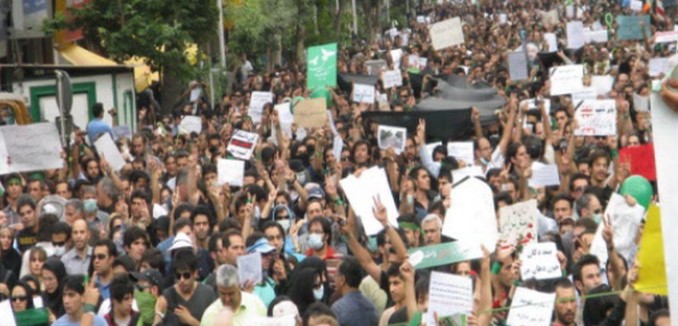Iranian dissidents fear that the nuclear agreement between the P5+1 powers and Tehran will free the regime to treat them more harshly, Saeed Ghasseminejad, a former Iranian political prisoner who is currently an associate fellow at the Foundation for Defense of Democracies, wrote in an op-ed published yesterday in the New York Daily News.
Ghasseminejad argued that these concerns are grounded in the history of Iran since the death of Ayatollah Ruhollah Khomeini, the founder of the Islamic Republic, which included the ascension of several reputed moderates to the presidency, a consequent easing of Western pressure on Tehran, and an ensuing spike in Iranian aggression both domestically and abroad.
Ali Akbar Hashemi Rafsanjani, one such reputed moderate, became president following Khomeini’s death, after which “International companies invested in Iran and the world decided to treat Tehran as a normal member of the international community.” Rafsanjani’s rule, however, was marked by Iranian aggression in foreign countries, including the deadly bombing of the AMIA Jewish community center in Argentina and assassinations of Iranian dissidents in Europe, which forced the West to once again isolate Tehran.
Rafsanjani was succeeded by another supposed moderate, Mohammad Khatami, and as soon as Iran once again normalized its political and business relations with Western countries, the regime “resumed assassinating dissidents, raiding universities, shutting down newspapers and jailing dissidents.”
With another reputed moderate, Hassan Rouhani, as president today, Iranian dissidents fear that the nuclear agreement with Tehran and the consequent normalization of relations will only increase the regime’s repression and the deterioration of human rights.
Iranian dissidents are sounding the alarm. Heshmat Tabarzadi, who spent the better part of the last 15 years in prison, wrote that “these days, after the mullahs achieved the agreement they needed, pressure on civil society is increasing.” Fariborz Raees Dana, a left-wing economist and also a former political prisoner, told the International Campaign for Human Rights in Iran that even with a deal, “a government that considers censorship its main power tool and sees it as a part of its ideology, will continue it in any way it can.” …
This skepticism is at odds with the tone in the West, where President Obama and others express hope the deal will open up Iran, strengthen its middle class and put the regime on a less aggressive path. In the last two decades, Tehran has moderated its policies only under pressure; resuming its aggression when that pressure is relieved.
Ghasseminejad warned that appeasing Iran by abandoning its dissidents is “bad policy,”and urged the West to continue pressuring Tehran, arguing that it is the only policy that has historically forced Iranian authorities to ease their human rights abuses.
Pressure has lessened on Iran since the election of Hassan Rouhani two years ago, although human rights violations have worsened. Ben Weinthal, a research fellow at the Foundation for Defense of Democracies, wrote earlier this month that many of the goods that will be sold to Iran as part of growing commercial ties with the West may be used by the regime to further its repression.
Last week, a group of 53 Iranian dissidents issued a letter warning that the funds released to Tehran as part of the nuclear deal will serve to enrich “tyrants and theocrats.” Last month, an Iranian human rights activist, Amir Basiri, wrote that allying with Iran to fight the Islamic State of Iraq and Syria (ISIS) would be fighting “evil with evil.”
In an effort to push back against these charges, Tehran recently tried to attack the reputation of United Nations human rights investigator, Ahmed Shaheed, who is responsible for documenting the human rights situation in Iran.
In a special briefing recently prepared by The Tower called Surrender in Vienna: Why We Need A Better Nuclear Deal With Iran (.pdf), Iranian-American activist Peter Kohanloo recommended that action be taken against Iran’s human rights abusers.
The U.S. should also ensure that Iranian officials who engage in human rights violations face the consequences of their actions. Possible options include asset freezes and travel bans on such individuals. Washington should also take every chance to publicize the regime’s oppression of religious minorities, dissidents, and the LGBT community. Spotlighting Iran’s poor human rights record will encourage dissidents inside the country who feel neglected. It will also serve as a poignant reminder to the international community as to how much worse the human rights situation will become now that the Iranian regime is on an established path to a nuclear bomb.
[Photo: hadikhai / YouTube ]




